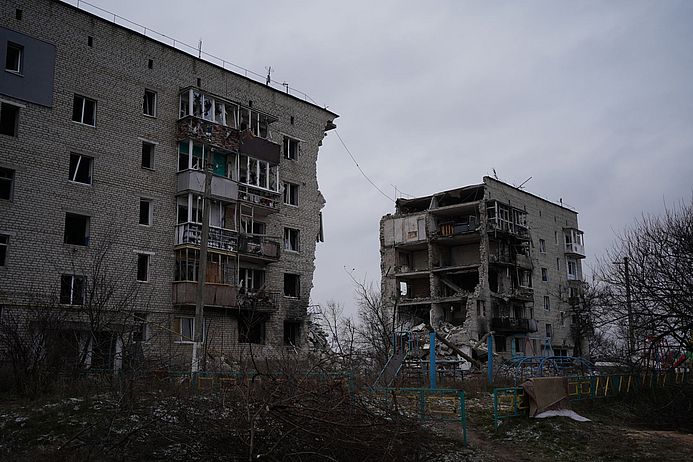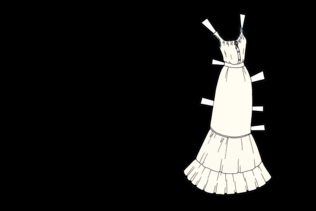By Katja Maurer
A year into the war of aggression against Ukraine, it is clear that this war is here to stay. It is no longer a war between countries, it is an intra-imperialist war in which the Russian semi-periphery is claiming a seat at the superpowers’ table (China and the US). Like 9/11 before it, it is rewriting the planetary-political map. Just as the “war on terror” reshuffled the cards of good and evil, and in turn which crimes can be spoken about and which are kept forever silent, this war is setting new standards, too.
We are heading towards a global war regime that is putting speech, political priorities, democracy, freedom and emancipation everywhere in extreme peril. The powerlessness of emancipatory positions in the face of the climate catastrophe is now experiencing a further shock, confronting us with the question of how all this can still be spoken about in any critical way at all. We are already seeing how war shifts all the parameters. Climate policy goals are being abandoned without so much as a second thought. Historical responsibility for the ecological disaster is giving way to entire continents being ruthlessly exploited to meet the resource wants of privileged countries. The language in which the respective media of record talk about the war is nudging us ever closer to the precipice of a seemingly inevitable military escalation. Russia’s neo-imperial nihilism is juxtaposed by a moral rigorism of the West that defines the Putin regime, if not Russians in general, as radically evil. This notion of the enemy creates internal coherence and paves the way to an authoritarianism that the West actually purports to be fighting.
This book by Raúl Sánchez Cedillo puts the Russian-Ukrainian war into context historically and politically contrary to these propagandistic simplifications, without using the rationale of geopolitics. With Putin, says Sánchez Cedillo, a war regime has come to power. So a regime that uses war and the external enemy to create internal coherence with the aim of perpetuating itself as a regime. It is almost a truism that the Russian secret service, which has never truly addressed and worked through its Stalinist-totalitarian past, has contributed considerably to this, among other things with staged terrorist attacks. The destruction of the Chechen capital Grozny and the deaths of some 75,000 civilians in two Russian-led wars are also part of this kind of Putinian war regime. At the same time, the regime has cemented its rule by ensuring that democratic spaces have become successively smaller, including opportunities for organisations like Memorial to address the Stalinist and Soviet past.
In its way, the “war on terror” starting in 2001 established a global war regime, dividing the world into friend and foe. Sánchez Cedillo’s book does us the service of reminding us of this and also of analysing the formation of post-Soviet society along the lines of rigid neoliberalism and its total fragmentation. Psychologising Putin and his regime as “radically evil” is not enough to understand the world we have unintentionally arrived at.
Aid and solidarity
medico international supports local partner organisations in Ukraine. For the first time in the history of this left-wing aid and human rights organisation, we are not working in the global South, but in an Eastern European country with its 30-year neoliberal transformation process, where real socialist history means an internationalist emancipatory idea is not exactly something that can be talked about in a day. When visiting colleagues in Kharkov or Kharkiv, the second largest city in Ukraine, 30 kilometres from the Russian border, in January 2023, it became clear very quickly that there are many Ukrainians who need to be talked about. Our partner organisation “Mirnoe Nebo” (Peaceful Sky) has become the largest local aid organisation in the Kharkiv region in the space of just a few months, including with our support. From a soup kitchen created out of necessity to provide warm meals to the population seeking shelter in the metro during continuous Russian shelling at the beginning of the war, it has become an organisation with over 200 employees over the course of just a few months. As such, “Mirnoe Nebo” has unexpectedly become an important player in the humanitarian scene, which also needs to be heard when it comes to rebuilding the destroyed areas in Kharkov and the other cities where they work. Eastern Ukraine is a good place to observe the parallelism between normality, reconstruction plans and actions and a war whose dimensions are unforeseeable.
The further west you move from here, the more the war becomes a fleeting impression. It manifests in the regular but isolated missile fire, in the power cuts imposed by the government to save energy, and in the military posts along the now well-developed main road, which - the further west you go - increasingly sport not just the blue and yellow flag of Ukraine, but also the black and red flag of the Ukrainian nationalists. In Lviv, the former Habsburg metropolis on the Polish border, there is even a sense of revelry in the shadow of the war, the likes of which the city has not seen for decades. After being magnificently restored in recent years, it is now experiencing a boom. The streets are teeming with shoppers and coffee house-goers, hipsters and feminists. Hip culture and consumerism go hand in hand. Over the course of the war, property prices have doubled. Privileged Ukrainians have settled here, children can go to school in person and not just virtually, and families do not have to separate. Men of military age are still not allowed to leave Ukraine. The war is creating new forms of a class-based society.
Whilst the colleagues in Kharkiv think politics in Ukraine is a dirty business, the health trade unionists we meet in Lviv hope the war will mean the end of oligarchy. They see nationalism as a solution which could lead to the emergence of a common national identity. As trade unionists, they are fighting against further deregulation, like the end of employee protection against dismissal just adopted by the parliament in Kyiv. For them, Ukrainian nationalism is not problem, it is an opportunity. This is not incomprehensible when you have witnessed first-hand and been the victim of a transformation process for 30 years which has destroyed all trust in the public sector with its radical privatisation.
Unfortunately, Ukrainian nationalism has no place for the idea of plurinationality. Nor is the path of the Kurds in Rojava, who gave up their idea of a nation-state in favour of a plurinational, multilingual entity, a possible horizon here. “Internationalism or Barbarism”, a title of one of Raúl Sánchez Cedillo’s chapters, would probably be met with an utter lack of comprehension. All the while the war is raging in all its horror in the east where the majority is Russian-speaking, whilst now that the war has broken out, the west of Ukraine is insisting on the complete enforcement of the Ukrainian language. A democratic Ukraine, which can only be bilingual, and which faces up to its complex history at the crossroads of cultures and empires, seems as unlikely a result of this war as the world peace we are being promised from arming Ukraine.
The precipice Ukraine and Europe are teetering on is as astounding as the fact that evidently few are thinking about how to move away from it. The idea of a constituent peace that Sánchez Cedillo proposes is the horizon. One possible practice would be to face reality without participating in the morally charged media battles that continue to move Europe towards the abyss by sheer assertion of truth.
The question is then: What are the possible acts of resistance here in our own country against a war regime that is destroying us and forcing us into questionable partisanship? Raúl Sánchez Cedillo proposes a form of exodus. How we are subjugated and how we subjugate ourselves is the subject of constant reflection and, above all, the subject of this book in the context of the war against Ukraine. “This War Will Not End in Ukraine” is a beginning and a possibility. Others will follow.
Translation: Rajosvah Mamisoa
To mark the anniversary of the start of the war in February 2023, medico supported the translation and publication of the German-language version of Raúl Sánchez Cedillo’s book, “Dieser Krieg endet nicht in der Ukraine”, by the publisher transversal texts.


